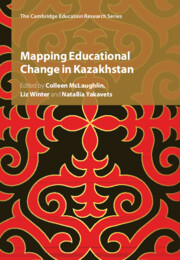Book contents
- Mapping Educational Change in Kazakhstan
- Mapping Educational Change in Kazakhstan
- Copyright page
- Dedication
- Contents
- Figures
- Tables
- Contributors
- Preface
- Acknowledgements
- Introduction
- Part I Foundations of Scaling Up
- Part II Piloting Initiatives and Scaling Up to the Whole System
- 6 Piloting the Renewed Content of Education
- 7 Revising the Content and Standards of Student Assessment
- 8 New Ways of Financing Schools
- 9 Professional Capacity of the Leading Schools as a Managing Mechanism in Updating the Content of Secondary Education in Kazakhstan
- 10 The Teacher Leadership in Kazakhstan Initiative
- 11 Developing Teachers as Researchers
- Part III Evidence of Implementation
- Conclusions
- Select Bibliography: School-Level Educational Reforms in Kazakhstan, 2011–2022
- Index
- References
11 - Developing Teachers as Researchers
Action Research as a School Development Approach
from Part II - Piloting Initiatives and Scaling Up to the Whole System
Published online by Cambridge University Press: 09 November 2023
- Mapping Educational Change in Kazakhstan
- Mapping Educational Change in Kazakhstan
- Copyright page
- Dedication
- Contents
- Figures
- Tables
- Contributors
- Preface
- Acknowledgements
- Introduction
- Part I Foundations of Scaling Up
- Part II Piloting Initiatives and Scaling Up to the Whole System
- 6 Piloting the Renewed Content of Education
- 7 Revising the Content and Standards of Student Assessment
- 8 New Ways of Financing Schools
- 9 Professional Capacity of the Leading Schools as a Managing Mechanism in Updating the Content of Secondary Education in Kazakhstan
- 10 The Teacher Leadership in Kazakhstan Initiative
- 11 Developing Teachers as Researchers
- Part III Evidence of Implementation
- Conclusions
- Select Bibliography: School-Level Educational Reforms in Kazakhstan, 2011–2022
- Index
- References
Summary
This chapter describes two major action research projects undertaken with teachers in Kazakhstan. The aim was to promote teachers’ engagement in curriculum reform and teacher professional development through action research in schools. The two settings were very different and both researched using multiple sources of evidence to explore what we have learned about the conditions for and blocks and facilitators to action research in Kazakhstani schools. A key learning was that the political task of providing the enabling conditions is a top priority if action research is to fulfil its huge potential, and this will determine whether it becomes embedded or not.
- Type
- Chapter
- Information
- Mapping Educational Change in Kazakhstan , pp. 189 - 202Publisher: Cambridge University PressPrint publication year: 2023



